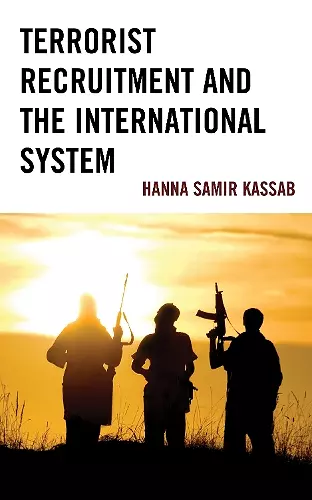Terrorist Recruitment and the International System
Format:Paperback
Publisher:Bloomsbury Publishing PLC
Published:23rd Jun '21
Currently unavailable, and unfortunately no date known when it will be back
This paperback is available in another edition too:
- Hardback£76.50was £85.00(9781793615145)

Recruitment is key to a terrorist network’s survival strategy. Steady enrollment is needed, not just to fight against perceived injustice, but to keep the network’s grand strategy alive. When a weak state fails to protect its territory and implement the rule of law because of corruption or incapacity, it results in the creation of power vacuums. Terrorist networks thrive within power vacuums and opportunistically fill the space where a weak state could not maintain control. This destabilizes the international system and forces great powers to intervene. Historically, interventions are ineffective in combatting terrorism and have actually increased recruitment through regional political destabilization. Further, interventions have drained the capabilities of states, allowing for shifts in the distribution of power, thus changing the international order. Understanding recruitment mechanisms is key to developing strategies to combat recruitment in the short and long term.
Kassab (East Carolina Univ.) analyzes the complex yet significant relationship between terrorist recruitment and weak states, emphasizing that power vacuums benefit terrorist recruitment in important (and complicated) ways. The overall result, Kassab argues, is the destabilization of the international system. The book is largely theoretical and based on secondary sources (magazine and newspaper articles and scholarly books and journal articles), government documents, and nongovernmental organization reports. The author organizes the book's six main chapters in two sections—"Levels of Analysis" and "Recommendations"— each comprising three chapters. In the first section Kassab examines terrorism at three distinct levels: the individual, the nation-state, and the international system. In the second section he makes recommendations for minimizing terrorist recruitment, leveraging a detailed analysis of the 2003 invasion of Iraq and its serious ramifications, especially the advent of the Islamic State. The author uses this instructive case study to consider short- and long-term solutions. This book is valuable for examining such vital concepts as resilience, the corrosive effects of corruption and underdevelopment on weak states, and the potential of inclusive political institutions to bolster a state’s legitimacy and thereby inhibit terrorist recruitment. Summing Up: Highly recommended. Lower-division undergraduates through faculty. * Choice Reviews *
“In his new book Terrorist Recruitment in the International System, Dr. Hanna S. Kassab offers new and important insights into the role of state failure or national power vacuums in providing key gateways for the recruitment of would-be terrorists. Terrorist groups and other non-state armed actors opportunistically fill the spaces where the state is absent or has lost legitimacy. The opportunities presented by weak states for terrorist recruitment are often overlooked in understanding how and why resilient terrorist groups thrive despite the years of effort to defeat their networks.” -- Douglas Farah, President, IBI Consultants, LLC
ISBN: 9781793615169
Dimensions: 218mm x 154mm x 14mm
Weight: 268g
174 pages